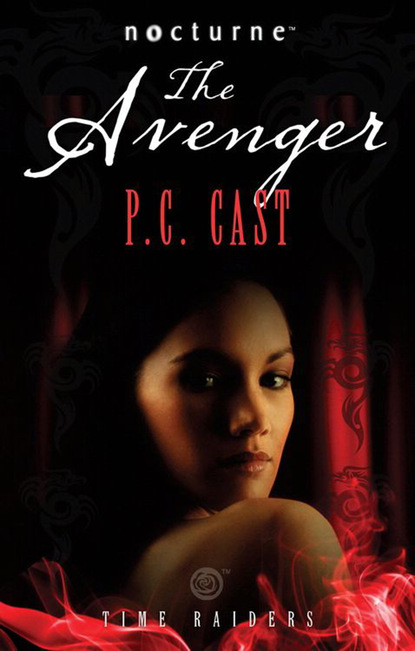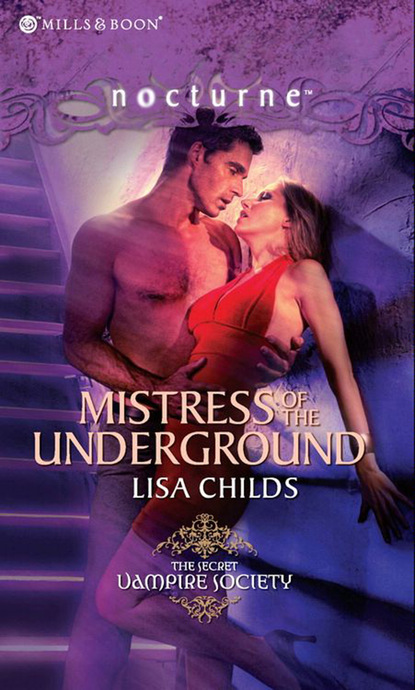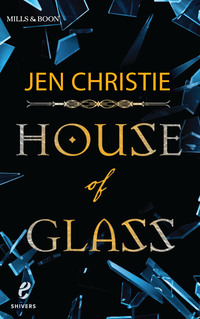
Полная версия
House Of Shadows
The tallest carving was dated 1865 and inscribed with the name Carrick. Twenty-one years ago; the same year she was born. She guessed Carrick’s age at thirty-seven or so. Penrose ran her finger over the mark. He would have been too young to head off to war. She noticed other names, Carville and Sampson, that were almost as high as Carrick’s. Older brothers, she reasoned, though the last dates etched for them were 1861 and 1862.
Penrose almost missed the last marking. It was so very low on the frame. She had started to walk away when her gaze caught the raw color of the newly scratched wood. There was no date, but the scar was so fresh that it had to be recent. Only the initials C.J. were visible, carved crudely, angular and far too large.
On the other side of the door frame, there were other odd markings. Tally marks—single lines gouged in the wood, with a slash running diagonally through them. Someone was counting in blocks of five, and there were dozens and dozens of blocks. She didn’t know what to make of it and ran her fingers over the gouges, wondering.
She went outside the double doors at the rear of the house. There was a small flight of stairs that ended on a gravel path. Pecan trees dotted the rear lawn before they gave way to marshy grasses. The Ashley River flowed in the distance, dark as mud and slow as honey. Immediately, she felt better, walking along with the sweet aromas of the summer flowers perfuming the air. Honeybees flew lazy arcs around her head. She walked until the heat got the better of her.
It was getting late. She wanted to be well rested for work. When she turned around to head back inside the manor, what she saw stopped her cold. There was a stone cellar beneath the house, and in the window she saw two figures bent over as if working at a desk. For a long time, she stood there, hand on her hip, staring at the window.
They didn’t move. She walked forward, slow as molasses in winter, her eyes trained on the window. She was half expecting one of them to jump up and scare her silly just for their own amusement. But, no, they were dark and still shadows in the dull shine of the windows. Standing and staring at them, she almost wished they would jump out and scare her. At least she’d know they were real people, then.
They definitely weren’t real, or if they were, they were fantastic at posing perfectly still. There wasn’t anything human about them. The way their bodies slumped looked awkward, a position that no one could hold for very long. Resting her hand on the wall of the house, she bent over the railing and tried to get a better look.
She had to lean out quite a ways before the shine on the window disappeared and she saw them clearly. They were faceless and formless wooden beings, slumped over in their chairs. The wood was perfectly cut and shaped to form odd, rounded limbs, hands like paddles and oval-shaped heads. They had no features on their faces, only smooth, dark wood.
Much as she tried to muffle her thoughts, Charlie’s words about Carrick and voodoo spells kept popping up. What kind of man was he?
After backing away from the window, she turned and ran back into the house. She may have been desperate and the pay might have been high, but it might not be high enough to make her stay here.
She went to find her room, her skirts sweeping the floor as she walked. She climbed the stairs to the second floor, gripping the balustrade with one hand and her air-light valise in the other. A stretch of red carpet covered the hallway. Dust bunnies gathered at the edges of the baseboards.
There were so many doors. Which one was his? She slowed, listening at each door, goose bumps on her skin, afraid he would somehow know and yank open the door. But all was quiet. Finally, she found the small stairwell at the end of the hall. Grim narrow steps rose in a tight spiral, and she had to focus on her feet as she climbed. A single door welcomed her at the landing and she stepped inside a large and airy attic that had been converted into a room. Though sparsely appointed, it pleased her.
Certainly it was a huge improvement over the storage closet she’d slept in for the past six months. A bed and dresser were tucked in a corner and there was a closet against one wall. A circular window, the biggest she’d ever seen, looked out across the front lawn. She ran her hands over the sill. The ledge was big enough that she could crawl up onto the sill, curl up and survey at the grounds.
She undressed and stretched out on the bed, relaxing against the pillow. But that creeping sensation returned again, the feeling that someone was watching her. She crawled under the covers and pulled them to her chin. It helped a little bit. Dimly, she heard the grandfather clock toll eleven mellow chimes. It was still morning. It felt like a lifetime since she’d first arrived at the manor. The lids of her eyes felt heavy. She gave in to the urge and closed them.
A few moments later, a strange shuffling noise grabbed her attention. It was an odd, sliding, shifting sound, like a cotton sack being dragged along a floor. Rising and wiping the sleep from her eyes, she went to the door and looked down the stairs. They were empty. But the sound persisted. She went completely still to pay attention.
The walls. The sound was coming from within the walls. A tight wave of icy fear swept her body as she listened. What a fool she’d been to race over here and hop on the easy-money bandwagon. That scraping, swooshing noise just wouldn’t stop.
Penrose sighed. Better to know. It was always better to know.
In her white cotton underthings and with her dark hair spilled around her shoulders, she tiptoed to the wall. She pressed her ear to the wooden panels. Silence. But something or someone was there. Taking shallow breaths, she walked along slowly, swallowing often to keep the bile from her throat. Again. A scratching. Scraping. Following the noise, she traced her finger over the plaster, drawing closer to the source. When the sound increased suddenly, she knew she’d located it. The sound was low to the ground. Dropping to her knees, she pressed her head to the wall and closed her eyes. The noise was quite distinct and just on the other side.
“Who’s there?” she whispered, surprised by the sharpness in her voice.
Complete silence. Then, distantly, the sound dimmed, more scratching. Still as stone, she stood, her whole being focused on the sound as it drifted farther away until there was only the sharp, quick hiss of her own breathing. She returned to her bed shaken, convinced she’d never sleep again, let alone take an afternoon nap. But she was wrong and fell quickly asleep.
* * *
Carrick Arundell parted the thick curtains and looked out at the unfamiliar sight of the afternoon sun. He hated the day, hated that aching yellow ball inching its way across the sky. It did nothing but bruise his eyes and burn his skin. It was the night he lived for—for the long, dark hours when the world was asleep and he emerged to create his inventions.
On most mornings, the rising sun was easy to ignore. Except for today. He’d twisted and turned in bed, reluctantly watching a streak of sunlight stretch across the floor. Finally, he’d given in. There would be no sleep today.
It didn’t sit well with him. He needed his energy. A thousand small setbacks plagued his project, and every single one had to fall into place before the mechanical man took his first step.
Now he could add one more setback. An image that he couldn’t get out of his mind. His new assistant standing in the doorway, pure midnight from head to toe. Black dress, black bonnet, black hair and a winter-white face peering out at the world. Any man would be tempted. But he wasn’t any man. He couldn’t afford to be.
No, it was more than that. It wasn’t just the project. It was the sight of her stepping back, her lips curling in disdain. The poor girl could barely talk. Dropping the curtain, he went to his wardrobe and began to dress for the evening.
Maintaining focus was crucial. Every day, his eyesight grew even weaker.
There was no choice but to control his thoughts about her. It wasn’t that he didn’t like women. Quite the opposite. It was that women didn’t like him. They stepped away, turned away, or looked down at their shoes when he approached. The only companionship he’d ever known, he’d paid for. Even then, the women turned their faces away from him.
Penrose had turned away, as well, but not before he caught a glimpse of her expression in the bright flash of the lightning. She’d looked up at him in a mixture of fear and horror. He’d grown immune to such looks. But coming from her it angered him.
Long ago, his heart had turned to iron. If he had his way, he would shun everyone. Keep the whole damn world out. But he needed the help of a steady hand and a good pair of eyes. Pretty blue eyes, a voice inside him added.
He went and looked for her, and when she couldn’t be found, he went up the small flight of stairs to the servant’s bedroom. The door to her room was ajar a few inches and he peered in and saw her sleeping on the bed. Toeing the door open, he stepped inside. Maybe he should have just knocked, but it happened before he knew his foot was moving, and then he was inside the room.
He watched her sleep. It seemed wicked, an indulgence more sinful than the women he paid to lift their skirts for him. Here he was, a man of thirty-six, and he’d never once seen the serene, soft expression of a woman lost in her dreams. Her features were soft now, not guarded like when he’d first met her.
The attic was warm that afternoon. She had two high spots of color on her cheeks. Her beauty was unusual, angular even. A sharp prettiness. The kind that could cut a man. But those two spots of color flaming away against all that tumbling black hair softened her looks. She sighed, and flung an arm out, revealing bare skin all the way to the strap of her undergarment. It was damn tempting.
He heard the clock chime the half hour. A half hour of prime working time lost just watching her sleep. Like a fool.
When he reached out to wake her, he shook her much harder than he intended to. Her eyes snapped open and met his gaze. For a brief second, she looked at him openly, her expression unafraid. He wanted to stop time, to linger in that tiny moment. But then the moment was gone.
Penrose’s eyes widened and her hands clutched at the covers, instinctively pulling them higher. She was like all the rest, he realized, as he felt the shutters on his heart slam shut.
Chapter 3
Penrose came to alertness from sleep in an odd rush, as if rising from a fog. Images still swirled in her brain—of Carrick looming above her, the chandelier spinning and spinning out of control, and the glittery windows of the manor watching her with their golden gaze. She knew if she opened her eyes, it would all prove true. So she lingered, stubbornly refusing to be roused. The grip turned harder still and shook her shoulders just firmly enough that she couldn’t ignore it anymore. Finally, she looked up and right into the kaleidoscope eyes of her new employer.
“You overslept.” It sounded like an accusation coming from him. The shadowy light of the afternoon made him appear deathly pale. Anger or some other emotion etched his face in a deep scowl.
“I’m sorry,” she said, voice heavy with sleep. She was disoriented, staring hard at him before rubbing her eyes. It was difficult to know if she still slept and he was just a dream. “I must have been very tired,” she managed to say.
He nodded. “Well, then, I’ll leave you to get dressed. Meet me downstairs in the cellar.”
“Fine. I’ll hurry.”
He left. She jumped up and dressed quickly, blood pounding in her veins. She wasn’t sure if it was fear of him or guilt at oversleeping, but she ignored it and moved quickly. She went to the kitchen to take the stairs that led down to the cellar and was surprised to see Carrick standing at the counter, eating.
“Come. Eat,” he said, barely turning to look at her. She went and stood next to him. He held out a steaming cup of coffee for her and she grabbed it greedily and took a sip. He was eating johnnycakes. She lifted one from the basket, smeared it with butter and took a bite. It was warm and buttery.
“Tell me, Miss Heatherton,” he said, between bites, “how it is you came to the agency?”
Her stomach dropped when he mentioned the agency and she spoke quickly, trying to change the subject. “Please, my name is Penrose. But everyone calls me Penny. If you want me to call you Carrick, I’d like the same.”
“Penny it is, then,” he said, and took a swig of his coffee. “Penrose. A prominent name around here. How did you come by that as a given name?”
She froze, johnnycake in midair. She wanted to lie. It was right at the tip of her tongue, yet when she opened her mouth, the truth came tumbling out. “My father was a Penrose.”
“I see. Skeletons in the proverbial closet, then? Since the family name is your first name and not your last, I’ll ask how come he tossed over your mother?”
For some reason, his harsh tone didn’t bother her. Nobody spoke plainly about this subject. It was a refreshing change and she found that more truths came forward. “My mother was an abolitionist.”
He made a strange noise and spit coffee out of his mouth. He laughed, hunched over next to the counter. Finally he regained his composure. “A Penrose and an abolitionist? Now that’s funny. They are the most painfully backward family on God’s good planet Earth. So, was your mother able to sway him to her point of view?”
“No. Then he died in battle right before the end of the Civil War. Just before I was born.”
“Hearts and beliefs are the two hardest things to change. You were born at an interesting time. You were born before or after the Civil War ended?”
“More than that, I was born on the very last day of the war. At midnight, in fact. My mother said that they had to choose what day to pick as my birthday. Obviously, my mother chose after the war.”
He went completely still. “My, my, my. A midnight baby, and on the last day of the war? The very last minute? You’re doubly cursed, Penny. Can’t you see it? One foot on the bright side of freedom and one foot in the shameful past. A suspicious mind might say you’re destined to live two lives.”
There was something sinister about him standing there—easy as you please—talking about curses. “I wouldn’t dare believe in such nonsense. I’m a practical sort.” But her words sounded forced, a bit too high.
“Are you, now?”
She nodded and took a bite of the corn bread. Silence fell over the room.
A few minutes later, he spoke up. “Ready to work?”
They walked down the stairs. This house had so many stairways, she thought to herself. The foyer. The attic. The kitchen. It was as if the house intended for people to get lost in it. Cool air rising from the cellar swirled around her as she followed him the last few steps into the workshop, looked around and struggled to keep her chin from dropping to the floor.
She couldn’t take even one more step. Not one. The room was simply too much to absorb. She could only stand and stare dumbly. It wasn’t so much the space. Oh, it was impressive—cavernous, cool and dark, with high ceilings and a fireplace big enough to stand it. It was more the feel of the room. Expectation hung in the air, with the sharp smells of woodsmoke and oil. Every inch of the floor was crammed with odds and ends, books, piles of gleaming metal bits, cords, tubes, wires and tools. She felt as though she’d entered a deep and secret mine where magical things could be wrenched free.
Her entire life had been orderly. Downtrodden, perhaps, but orderly. Their little home had been converted to a humble finishing school, the kind the middle-class folks sent their daughters to. She grew up amid books that were neatly shelved and papers that were always stacked neatly. There was the feeling of possibility in the school, too—and it felt wonderfully familiar. But the school had provided an orderly process of discoveries. This room was chaos. She wasn’t sure what to make of it.
“It used to be the kitchen,” Carrick said, walking to the fireplace and tossing a handful of tinder into it. He struck a match and threw it onto the wood. A flame blazed to life. He fanned it, sending a hiss and spray of sparks into the air. “When my project outgrew the library, I moved the kitchen upstairs and took over this room.” He gathered some logs and fed them to the growing blaze. Even though it was high summer, the cellar was chilly, so she welcomed the heat.
Carrick walked about the room lighting lamps and candles. He handed a candle to Penrose, and she helped him with the rest. He continued, “The problem with this room is the lack of light. I have lamps on all the walls, but the large open space where I do my work needs even more light.”
A schematic of the human body hung on one wall. Another had a large calendar. And then she saw what had scared her silly earlier—the wooden beings slumped in their chairs. Her heart stopped, she swore it did, and she brought her hand to her chest to feel its beat before relaxing a bit. What did he do with them?
“Are you coming?” he asked.
“Of course.”
He continued, “Though lamplight is fine, the direct brightness affects my eyes. I prefer candles close by. You’ll be making candles for me. I require special ones.”
“I see,” she said, making a mental note to arrive early and have the workroom lit and ready for him.
He gestured toward the center of the room, where a huge work area made up of many tables pushed together formed a half circle. In the center of the tables, something large bulged from underneath a blanket. Whatever it was, it was larger than a man and twice as wide.
Approaching, she held the candle in the air. “What is it?” she asked, unable to hide the wonder in her voice.
Carrick stood behind her. She neither heard his approach nor felt his presence, so when he spoke, it startled her. He stood inches away. “That is the future. A mechanical man.” He held up his candle. “Go ahead, pull the blanket off.”
She bent down, yanked the blanket away, and the mechanical man stood before her. She blinked and looked up. He was tall, taller than Carrick, taller than any man she’d ever seen. He had a barrel chest, a boxy head and two small lanterns that served as eyes. Wide shoulders sat atop his torso and rivets ran up and down his body like buttons. He resembled a metallic boxer, stout and strong, his skin glistening silver-orange in the firelight.
“What does he do?” she asked in awe. “Can he even move?”
“Anything you want,” Carrick said with pride. “Within reason, of course.”
He seemed to burst with life. He seemed solid. Dependable. But there was something threatening about a heap of metal sculpted into the shape of a human. Some inner part of her recoiled. Not a big part, but enough of a part to steal her words for a few moments as she took in the sight of him. Him. Funny that she thought of it in such familiar terms already.
“Just like in those paperback novels,” she said. She’d once read a scary story about a man who built a steam-powered person and then attached him to a buggy. The man walked across the entire country step by step. When they reached Kansas, the steam-powered man went haywire and killed the man who had created him. That was fiction. She now stood before the real thing, and she wasn’t sure if that made her feel better or worse about it.
“Yes. Just like in those fanciful stories. Except this one is real.” She’d almost forgotten about Carrick. Almost. But the he stood close enough behind her that when he spoke she could feel the air from his breath on the back of her neck.
“How do you give him life?” she asked. “How do you do that?” It was the thousand-dollar question in her mind. She whispered the next word. “Magic?”
He laughed harshly. “Is that what you heard?”
“Perhaps.”
“And what do you think of the things you’ve heard?”
“You’re not paying me to think about what I’ve heard.” She turned, forcing her eyes to meet his and hold his gaze. “That’s what I think.”
“You’re either very clever or very hungry.”
“Or both.”
“Are you as prim and proper as you look?” The tone of his voice changed in that instant. It grew deep and mellow, almost dreamy. But not soothing. Not by a Georgia mile.
She stood stiff, aware of the length of his body right behind hers. He didn’t touch her. He didn’t need to. She could feel the heat from his body as surely as she could from the fire in front of her. “Now, you tell me. Do you like to be judged by the way you look?”
“Touché, Miss Heatherton.”
“Penny. Call me Penny.”
His lips graced the tender spot behind her ear. “Penny,” he whispered, saying the name so low that it came not as a sound but as a rumble against her skin. Then he was gone, the hard strike of his boots ringing out on the stone. She was left with a wave of cool air. He strode in front of her to the mechanical man. “Does he scare you?”
“Yes. He makes me nervous. It’s a feeling I can’t describe. But I’m drawn to him,” she answered, unsure if she was referring to the mechanical man or to him.
He was quiet. “Some quake in their shoes when they see him,” he finally said.
“What’s his name?”
“Name?” He laughed, a mellow, rolling, velvety sound. “He doesn’t have one, of course.”
“But he has to have a name. How can you create something that looks so, well, humanlike—and not give it a name?”
“You can name him. It makes no difference to me.”
“Harris.” The name came to her instantly and once she spoke it, it fit nicely. “We’ll call him Harris.”
“Harris,” he said thoughtfully, walking to Harris and running a finger along his steely arm. “That sounds fine. And yes, to answer your question, he can move. When he’s functioning. But that’s part of the problem. Somewhere inside of him, a gear is tooled wrong. The timing is off, so he can’t walk. I’ve altered the design a million times. It seems there’s always a fatal flaw, and I always discover the flaw too late to correct it. Then I’m forced to destroy my creation and start again. I’m hoping that I’ve discovered the flaw in time.”
She looked up. “How do you know that all flaws are fatal? Perhaps you shouldn’t design them with one goal in mind but rather an open idea of their potential.”
He turned. “You’re sharper than I gave you credit for, Penny.”
“Thank you.” She felt a rush of pleasure at his compliment.
The heat from the fire filled the room, making sweat break out on her forehead.
“You grasp the fundamental concept. One that I’m aware of. The earlier types I created were simply too crude. It’s been an agony just to get to this most basic creation. And even though I love doing it, I rue the day I first got the idea.” He sighed and went to the windows, opening them first before going to the doors and propping them open, too.
“My apologies. I get too wrapped up in it.” Sweet night air filled the room. A pleasant, earthy smell filled the room, carried up from the river by the wind.
He walked over to a wall where a poster of the human anatomy hung. Pencil marks and notes covered the simple drawing of the human being. “I have a question for you. What do you think is more important, form or function?”
Penrose thought for a moment about whether beauty or purpose should be held in higher regard. “Well, I think the function should be the guiding principle.”
“Agreed.”
“Whenever possible, the form should be pleasing, as well.”
His eyes moved from the picture to Penrose. “Very good. I’m pleased. Ideally there would be a balance between the two.”
He went to the wall and placed his hand over the image of the human hand. He was a big man, tall, and his hands eclipsed the one on the diagram. “The real key to designing a mechanical man is to decide where form and function join. Where they come together.”
“I don’t understand.”
“I need to reduce form to its barest minimum. Man will never be able to reproduce the complexity of the human body. It’s up to me to decide what’s essential and what I can leave out to save on engineering costs and time.” He looked back to the poster. “What is the most basic element of being human? If you can answer that, then my instinct says you’ll also have perfect form.”





